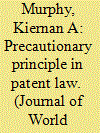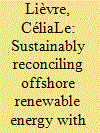|
|
|
Sort Order |
|
|
|
Items / Page
|
|
|
|
|
|
|
| Srl | Item |
| 1 |
ID:
086332


|
|
|
|
|
| Publication |
2009.
|
| Summary/Abstract |
The significance of the threat of bioterrorism lies in the fear that it generates, `threat' in this context constituting not just a physical manifestation of impending danger but also a reflection of a subjective vulnerability derived from a fear of an eventuality that cannot be predicted, identified or controlled. It is a threat that plays upon our perceived biological vulnerabilities in a contemporary environment where biotechnological innovation has reconfigured European relations to biological threat and where security is increasingly informed by risk. Confronting the threat of bioterrorism in Europe, then, necessarily requires engaging with the fear associated with it. This article argues that it is by conceptualizing bioterrorism through the notion of `dread risk' that this can best be accomplished. In so doing, it elucidates the manners in which perceptions of threat interact with articulations of security to inform a cyclical threat-defence dynamic, enabling a more explicit engagement with the ways in which Europe is not only subject to biological insecurity but also a facilitator of it.
|
|
|
|
|
|
|
|
|
|
|
|
|
|
|
|
| 2 |
ID:
078344


|
|
|
|
|
| Publication |
Canada, UBC Press, 2007.
|
| Description |
xii, 324p.
|
| Standard Number |
9780774812689
|
|
|
|
|
|
|
|
|
|
|
|
Copies: C:1/I:0,R:0,Q:0
Circulation
| Accession# | Call# | Current Location | Status | Policy | Location |
| 052525 | 343.0786606/AND 052525 | Main | On Shelf | General | |
|
|
|
|
| 3 |
ID:
092463


|
|
|
|
|
| Publication |
2009.
|
| Summary/Abstract |
The precautionary principle (PP) has rapidly emerged as a staple of international environmental law and attempts have been made to extend it into other fields. This article examines whether the PP can or should be extended into patent law. First, an assessment of the general arguments in favour of extending the PP into patent law is performed, followed by an analysis of its applicability within Canadian patent law as it is currently enacted. Then, the arguments against a precautionary patent law are scrutinized.
|
|
|
|
|
|
|
|
|
|
|
|
|
|
|
|
| 4 |
ID:
098549


|
|
|
|
|
| Publication |
2010.
|
| Summary/Abstract |
In this paper the precautionary principle is reviewed alongside the process of international implementation. Adoption of the precautionary principle is advocated to deal with energy choices as a mechanism to account for potential climate change impacts, notwithstanding the debate on scientific uncertainty on the links between solar activity, greenhouse gas concentration and climate. However, it is also recognized that the widespread application of the precautionary principle to energy choices does not seem to be taking place in the real world. Relevant concrete barriers are identified stemming from the intrinsic logic governing the hegemonic economic system, driving the energy choices by economic surplus and rent generation potential, the existence of social asymmetries inside and among societies as well as by the absence of democratic global governance mechanisms, capable of dealing with climate change issues. Such perception seems to have been reinforced by the outcome of the United Nations Climate Change Conference, held in Copenhagen in December 2009.
|
|
|
|
|
|
|
|
|
|
|
|
|
|
|
|
| 5 |
ID:
093673


|
|
|
|
|
| Publication |
2009.
|
| Summary/Abstract |
This paper looks at the way in which the idea of the Precautionary Principle, increasingly influential in environmental and other policy areas, is being and might be used in foreign and security policy. It aims to contrast the relative precision with which the term is used in the environmental arena with the current usage in international relations. Contrasting the Precautionary Principle with ideas of precaution, prevention, pre-emption and similar terms in post-structuralist analyses of risk, humanitarian intervention and US foreign policy in the aftermath of 11 September 2001, the paper identifies costs and benefits in deploying a more carefully specified account of the Precautionary Principle. In particular, it highlights key issues of regulatory authority and the way in which policy-makers and analysts understand and respond to the limits of knowledge and knowledge systems as important challenges to which careful use of the Precautionary Principle can potentially contribute. The paper concludes by suggesting that both policy-making and policy analysis could potentially be improved by adapting and extending the idea of the Precautionary Principle as it is deployed in other policy arenas.
|
|
|
|
|
|
|
|
|
|
|
|
|
|
|
|
| 6 |
ID:
166567


|
|
|
|
|
| Summary/Abstract |
The nascent nature of offshore renewable energy (ORE) technologies coupled with the existence of considerable data gaps and uncertainty on the receiving marine environment demands a paradigm shift in our approach to assessing and managing the impacts of the ORE sector on marine Natura 2000 sites. This paper investigates how the ecosystem-based principles of resilience and adaptive management can be best applied under the appropriate assessment process of the Habitats Directive to reconcile the increasing demand for offshore renewables and biodiversity conservation. In so doing, it challenges the strict interpretation of the precautionary principle which has been crystallised by the EU judiciary under the regime of Article 6(3) of the Habitats Directive and suggests embracing adaptive management as a better methodology to enhance the outcomes of the appropriate assessment in the face of uncertain impacts on Natura 2000 sites and their qualifying features. The aim of this study is solution-based: it seeks to improve the implementation of the assessment procedure of the Habitats Directive before it truly becomes an ‘obstacle course’ for offshore renewable energy developers.
|
|
|
|
|
|
|
|
|
|
|
|
|
|
|
|
|
|
|
|
|